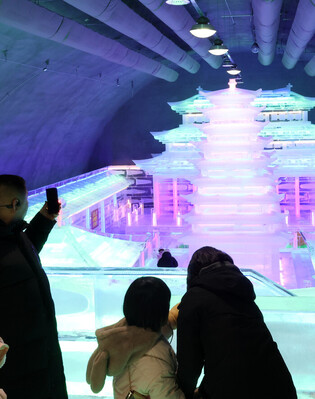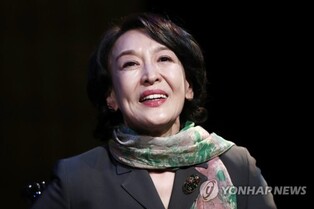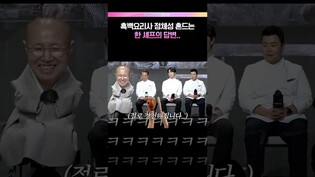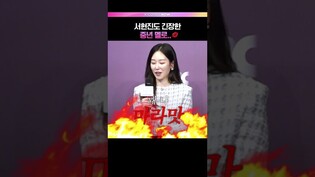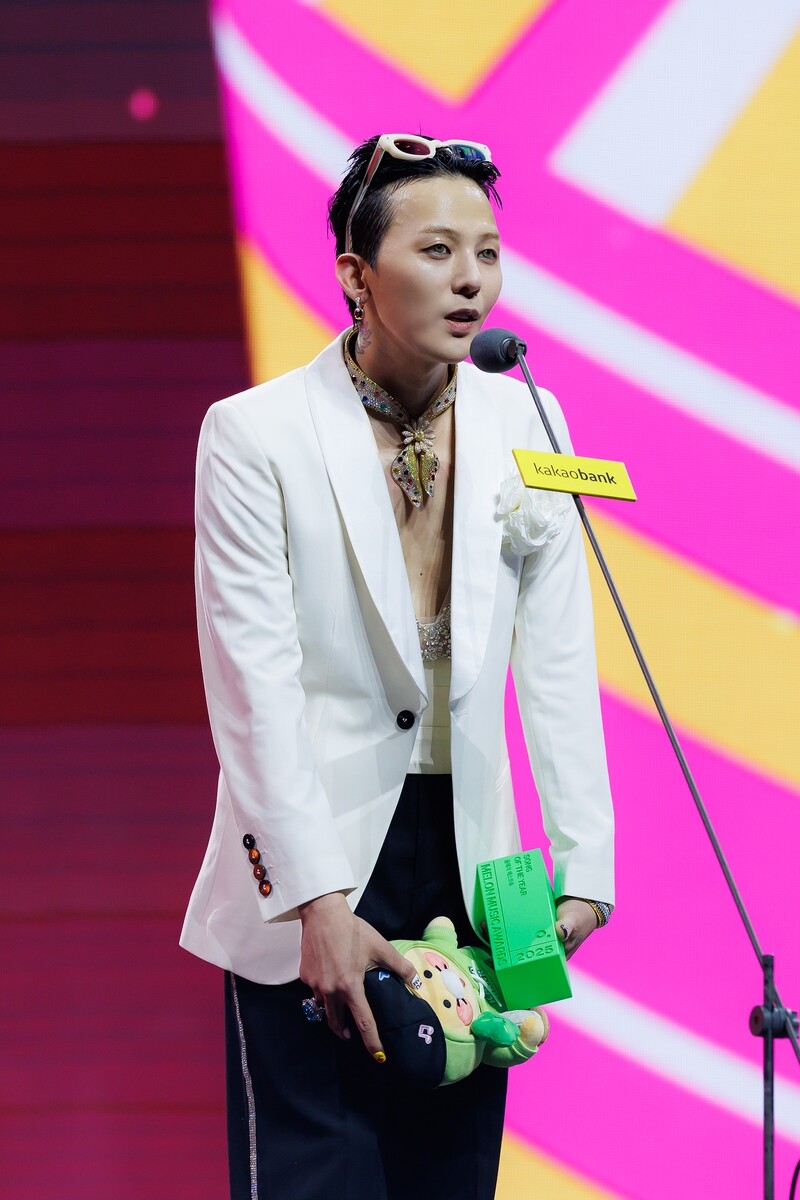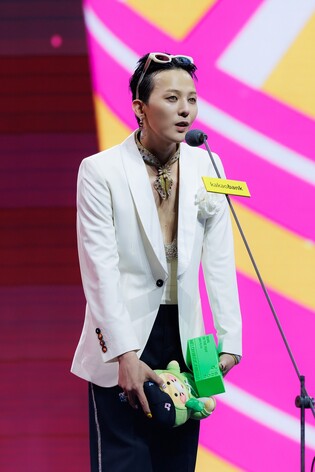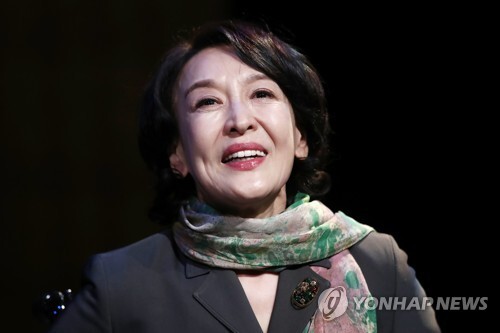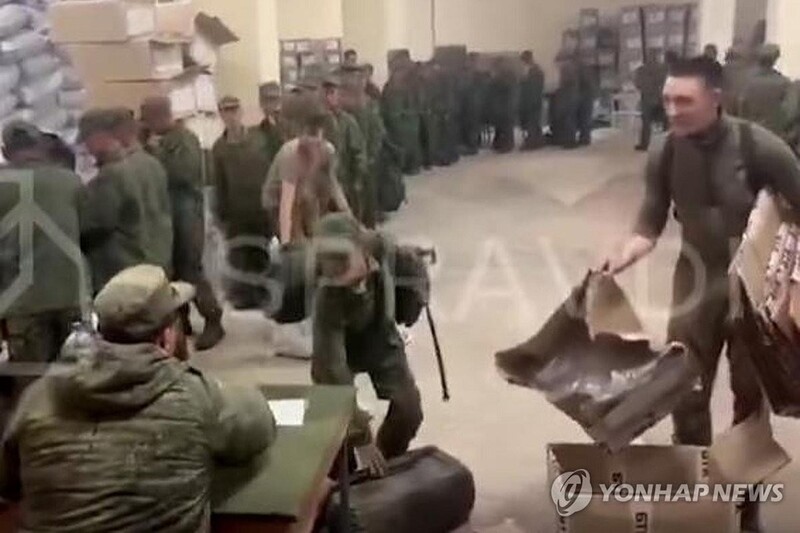 |
| ▲ This undated image captured from the Center for Strategic Communication and Information Security of Ukraine shows soldiers suspected to be North Koreans receiving apparent Russian military gear. (PHOTO NOT FOR SALE) (Yonhap) |
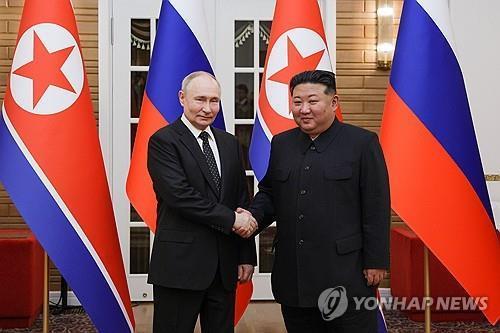 |
| ▲ This photo, released by Russia's TASS news agency, shows Russian President Vladimir Putin and North Korean leader Kim Jong-un posing at the Kumsusan State Guest House at their summit on June 19, 2024. (Yonhap) |
(News Focus) NK troops-Ukraine
(News Focus) N. Korea's involvement in Ukraine war heightens security risks beyond battlefield to Korean Peninsula
By Chae Yun-hwan
SEOUL, Nov. 6 (Yonhap) -- The front-line deployment of North Korean troops in support of Russia's war effort in Ukraine would pose significant risks that extend beyond the battlefield to impact the security environment on the Korean Peninsula, also marking a significant development since Russia's full-scale invasion of Ukraine in 2022, analysts said.
Concerns of North Korean soldiers participating in the Russia-Ukraine war in recent weeks were confirmed after Ukrainian President Volodymyr Zelenskyy said his country's forces had engaged in their first battles with North Korean troops.
"The first battles with North Korean soldiers open a new page of instability in the world," Zelenskyy said in a video address on Tuesday.
Hours earlier, South Korea said more than 10,000 North Korean troops are in Russia, with a "considerable" number of them dispatched to front-line areas, including Russia's western border region of Kursk.
Analysts say the current number of North Korean troops could help Russian President Vladimir Putin's immediate efforts to gain ground in Kursk, where a major Ukrainian offensive took place in August.
"Putin may perceive that the addition of the North Korean combat personnel may make it possible for his military to accomplish a tactical breakthrough against Ukraine's forces in the Kursk region," Bruce Bennett, a senior defense analyst at the RAND Corp., said.
North Korean boots on the ground, however, carry broader security implications as they mark a shift from what has been a war between Ukrainian and Russian troops.
Last week, Mark Rutte, the head of the North Atlantic Treaty Organization (NATO), said North Korea's troop deployment represents a "significant escalation" and a "dangerous expansion" of the war.
Choi Yong-hwan, a senior research fellow at the Institute for National Security Strategy, described the deployment of North Korean troops as marking a transformation of the conflict into an "international war."
"North Korean troops' participation in the war will become a justification for Zelenskyy's requests to attack Russia's mainland, while calls for South Korea's support for Ukraine will increase," he wrote in a recent report.
The troop dispatch itself might not have a big impact on the ground, Choi said, but it will likely lead to changes in international relations.
The development has raised concerns over its impact on the security environment on the Korean Peninsula as ties between Moscow and Pyongyang appear to only grow stronger -- underpinned by their "comprehensive strategic partnership" treaty signed in June.
"Pyongyang's illegal military cooperation with Moscow may not have immediate physical effects on the Korean Peninsula, but it further escalates tensions, damages prospects for diplomacy, and yields financial and technological benefits for the Kim regime," Leif-Eric Easley, a professor of international studies at Ewha Womans University, said.
South Korea has increasingly voiced concerns over the North's troop deployment, vowing "phased" steps in response to the level of military cooperation between North Korea and Russia.
Throughout the war, Seoul has only directly sent humanitarian aid and financial assistance to Kyiv, apparently mindful of its ties with Russia, while cooperation between Moscow and Pyongyang has only deepened.
"Seoul's self-restraint in supplying weapons for Ukraine's defense has bought it little to no reciprocity from North Korea or Russia," Easley said.
In a sign of Seoul's willingness to increase support for Kyiv, a delegation of high-level South Korean officials visited Ukraine last week to discuss cooperation over the North's troop dispatch.
South Korean officials have called for the need to send a team of observers to Ukraine to analyze North Korean troops, raising concerns that their experience in the war could have implications on South Korea's security.
"If North Korean troops deployed to Russia gain knowledge of modern warfare tactics, including the use of drones, such expertise could be shared across the North's regular forces, numbering more than a million," National Security Adviser Shin Won-sik told lawmakers last week.
Concerns also persist over what Pyongyang could be receiving in return for its troop dispatch as it seeks to advance its weapons programs, highlighted by its test launch of a new intercontinental ballistic missile last week.
"North Korea is undoubtedly asking Russia for advanced military technology in exchange for its soldiers. That advanced technology could be dangerous if used against South Korea and the United States," Bennett said.
The growing security risks posed by the cooperation between North Korea and Russia also come amid uncertainties posed by the U.S. presidential election to the war in Ukraine.
Republican candidate Donald Trump has said he could end the war in Ukraine in a single day, raising concerns over his approach, while his Democratic rival Kamala Harris has vowed to continue supporting Ukraine.
Choi said the timing of the North's troop dispatch just ahead of the election appears to reflect the possibility of a Trump victory that could lead to an early end to the war.
"If the Russia-Ukraine war ends early, (North Korea) can no longer be confident in the future of its relationship with Russia," he wrote. "For North Korea, it needs to tie Russia up to its foreign strategy before the end of the war."
Others said the partnership between Moscow and Pyongyang will likely continue to pose security threats whoever takes office.
"Regardless of who wins the U.S. presidential election, Kim and Putin's axis of transactionalism is likely to pose a growing threat to security in both Europe and Asia," Easley said.
(END)
(C) Yonhap News Agency. All Rights Reserved

















